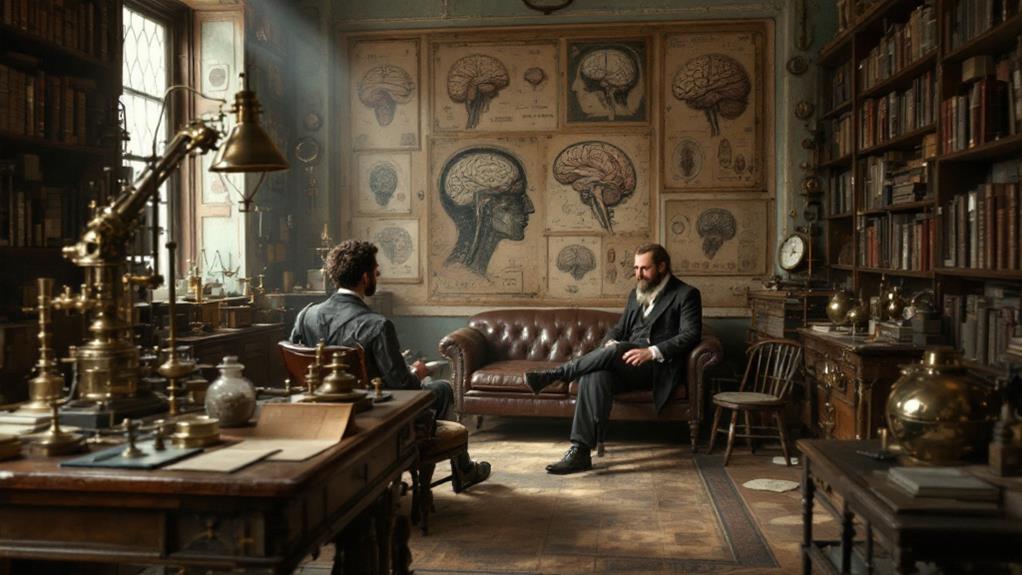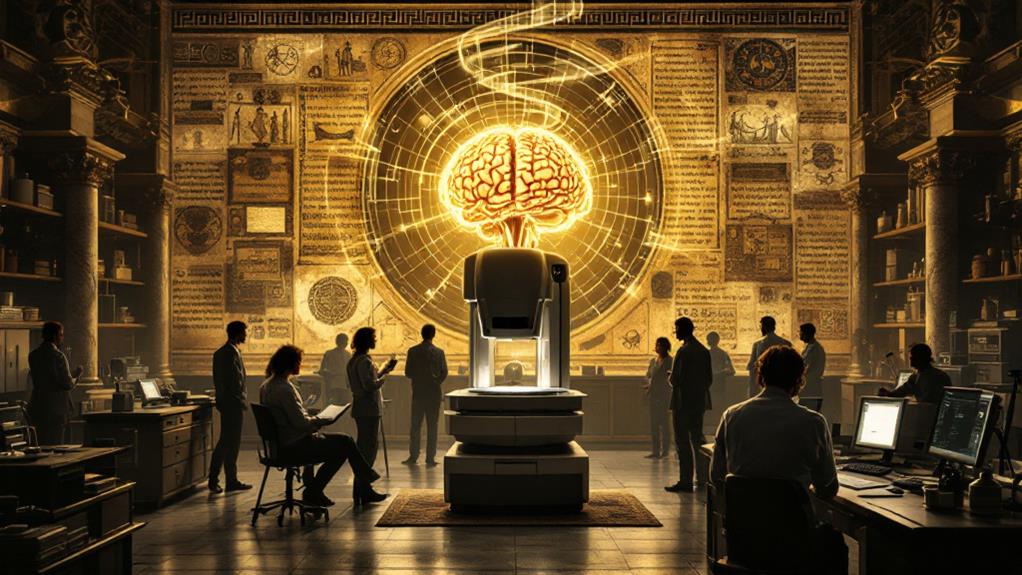The History of Psychology: From Ancient Philosophies to Modern Science

Psychology's voyage spans millennia, from ancient philosophical musings to a modern scientific discipline. You'll find its roots in early civilizations, where concepts of mind and behavior intertwined with spirituality. During the Renaissance and Enlightenment, rational thinking paved the way for empirical approaches. The late 19th century marked psychology's birth as a formal science, with Wundt's first laboratory in 1879. Since then, various schools of thought have emerged, from structuralism to cognitive psychology. Today, advanced research methods and technology drive the field forward, influencing education, healthcare, and policy. The evolution of psychology offers fascinating understandings into human nature and societal progress.
Ancient Roots of Psychological Thought
From the dawn of civilization, humans have pondered the mysteries of the mind. Ancient beliefs about the mind often intertwined with religious and spiritual concepts, attributing thoughts and behaviors to the influence of gods or supernatural forces. In ancient Egypt, you'd find the concept of the heart as the seat of emotion and intellect, while in Mesopotamia, mental illnesses were believed to be caused by demonic possession.
As civilizations advanced, early philosophical perspectives on behavior emerged. In ancient Greece, you'd encounter Hippocrates' theory of four humors, which linked personality traits to bodily fluids. Plato proposed the tripartite soul, dividing the psyche into reason, spirit, and appetite. His student Aristotle emphasized empirical observation and developed ideas about memory, perception, and dreams.
In ancient China, Confucius studied the nature of human relationships and moral development, while in India, Buddhist and Hindu philosophies examined consciousness and self-awareness. These diverse ancient roots of psychological thought laid the foundation for future investigations into the human mind, setting the stage for the eventual emergence of psychology as a distinct scientific discipline.
Renaissance and Enlightenment Contributions
In light of the Renaissance and Enlightenment periods, psychological thought experienced a significant revival and alteration. You'll find that the philosophical mindset of these eras shifted towards rationalism and empiricism, paving the way for more systematic approaches to understanding the human mind.
During the Renaissance, thinkers like Descartes proposed the concept of mind-body dualism, which would influence psychological theories for centuries. You'll notice that this period also saw a renewed interest in human anatomy, including the brain, which laid the groundwork for future neuroscientific discoveries.
As you move into the Enlightenment, you'll encounter figures like John Locke, who introduced the idea of the mind as a "blank slate" shaped by experience. This concept would later influence behaviorism in psychology. The Enlightenment's emphasis on reason and scientific investigations led to more rigorous methods of studying human behavior and cognition.
You'll see that these periods marked a pivotal transition from purely philosophical speculation to more empirical approaches in psychology. They set the stage for the eventual emergence of psychology as a distinct scientific discipline in the 19th century.
Birth of Modern Psychology

While the Renaissance and Enlightenment laid essential groundwork, psychology's birth as a formal scientific discipline didn't occur until the late 19th century. You'll find that this period marked a crucial shift in how we study the human mind and behavior.
The structuring of psychology as an academic discipline began with Wilhelm Wundt's establishment of the first psychological laboratory in Leipzig, Germany, in 1879. This event is often considered the official start of psychology as a separate field of study. Wundt's approach, known as structuralism, aimed to break down mental processes into their basic components.
The influence of the medical field was significant in shaping early psychology. Physicians like Sigmund Freud developed theories about the unconscious mind, while others focused on the biological basis of behavior. You'll notice that this medical influence led to the development of various schools of thought, including functionalism, behaviorism, and psychoanalysis.
As psychology evolved, it incorporated methods from natural sciences, emphasizing empirical research and statistical analysis. This scientific approach helped establish psychology's credibility and paved the way for its rapid growth in the 20th century.
Major Schools of Thought
As psychology established itself as a distinct scientific discipline, several major schools of thought emerged, each offering unique viewpoints on human behavior and mental processes. You'll find that these schools shaped the field's development and continue to influence modern psychological practices.
Structuralism, founded by Wilhelm Wundt, focused on breaking down mental processes into basic components. In contrast, functionalism, championed by William James, emphasized the purpose of consciousness in adapting to one's environment. Behaviorism, led by John B. Watson, rejected introspection and focused solely on observable behaviors.
Gestalt psychology emerged as a response to structuralism, emphasizing the importance of perceiving patterns and wholes rather than individual elements. Psychoanalysis, developed by Sigmund Freud, explored the unconscious mind and its influence on behavior. Humanistic psychology, pioneered by Carl Rogers and Abraham Maslow, emphasized personal growth and self-actualization.
In recent decades, cognitive processing theories have gained prominence, exploring how the mind processes information. Neuroscience and behavior studies have also become increasingly important, linking brain function to psychological phenomena. These diverse schools of thought continue to shape our understanding of the human mind and behavior.
Advancements in Research Methods

Advancements in research methods have revolutionized the field of psychology. You'll find that these improvements have allowed researchers to gain deeper comprehension into human behavior and cognition. One significant development is the increased use of longitudinal studies, which track participants over extended periods. These studies provide essential data on developmental changes and long-term effects of various factors on psychological well-being.
Experimental designs have also become more sophisticated, enabling psychologists to isolate variables and establish cause-and-effect relationships more accurately. You'll notice that modern research often employs randomized controlled trials, which help eliminate bias and confounding factors.
Technology has played an indispensable role in advancing research methods. Brain imaging techniques like fMRI and EEG allow you to observe neural activity in real-time, providing exceptional insights into cognitive processes. Additionally, big data analytics and machine learning algorithms have enhanced researchers' ability to analyze large datasets and identify patterns that were previously difficult to detect.
Ethical considerations have also evolved, with stricter guidelines protecting participants' rights and well-being. You'll find that informed consent, confidentiality, and debriefing procedures are now standard practices in psychological research, ensuring that studies are conducted responsibly and with respect for human dignity.
Contemporary Trends and Future Directions
Numerous contemporary trends are shaping the future of psychology. You'll find that interdisciplinary collaboration is becoming increasingly important, as psychologists work with experts from fields like neuroscience, computer science, and genetics. This cross-pollination of ideas is leading to groundbreaking discoveries about the human mind and behavior.
Technological integration is another key trend you'll notice. From brain imaging techniques to virtual reality therapy, technology is revolutionizing how psychologists conduct research and treat patients. You're likely to see even more advanced tools emerge in the coming years, enhancing our comprehension of mental processes and offering new treatment options.
As you look to the future of psychology, you'll encounter:
- Exciting breakthroughs in understanding consciousness and the nature of the self
- Innovative approaches to tackling global mental health challenges
- Surprising perceptions into the impact of social media and digital technology on human behavior
These developments are not only expanding the field's horizons but also challenging long-held beliefs about the mind. As psychology continues to evolve, you'll witness its growing influence on various aspects of society, from education and healthcare to business and public policy.



